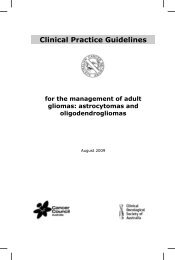Clinical Practice Guidelines for the management of locally advanced ...
Clinical Practice Guidelines for the management of locally advanced ...
Clinical Practice Guidelines for the management of locally advanced ...
You also want an ePaper? Increase the reach of your titles
YUMPU automatically turns print PDFs into web optimized ePapers that Google loves.
Hormone refractory/castrate resistant disease with painful bone metastases<br />
In a RCT (n=378) <strong>of</strong> pamidronate disodium (iv), Small et al 2003 31 did not find a significant overall<br />
reduction in <strong>the</strong> number <strong>of</strong> SREs in <strong>the</strong> pamidronate arm (23%) compared with <strong>the</strong> placebo arm<br />
(24%) after 27 weeks <strong>of</strong> treatment (p=1.00).<br />
Four low-quality, underpowered RCTs examined <strong>the</strong> effects on response and progression <strong>of</strong><br />
bisphosphonates as an adjunct to chemo<strong>the</strong>rapy. In an open phase 2 trial with 72 men, Figg et al<br />
2005 32 compared alendronate plus ketoconazole with ketoconazole alone in hormone-independent<br />
prostate cancer and found no difference in response rate ( p=1.00) or progression-free survival (p =<br />
0.27). Eloma et al 1992 33 and Kylmala et al 1997 34 found that <strong>for</strong> those with six month (n=54) and 12<br />
month (n=15) follow-up assessments, <strong>the</strong> addition <strong>of</strong> clodronate to estramustine did not significantly<br />
reduce <strong>the</strong> incidence <strong>of</strong> progression. Similarly, Ernst et al 2003 35 , in a trial with 209 men, did not find<br />
that clodronate given in addition to mitoxantrone and prednisone significantly improved symptomatic<br />
progression-free survival. There was no specific reference made to SREs, however.<br />
Prevention <strong>of</strong> bone metastases <strong>for</strong> patients with clinically organ-confined/non-metastatic prostate<br />
cancer<br />
A recent paper by Mason et al 2007 36 reports that in a randomised placebo-controlled trial with a<br />
median follow up <strong>of</strong> ten years, men with <strong>locally</strong> <strong>advanced</strong> disease (most <strong>of</strong> whom received hormone<br />
<strong>the</strong>rapy or radio<strong>the</strong>rapy as primary treatment), did not receive any benefit in terms <strong>of</strong> decreased<br />
incidence <strong>of</strong> symptomatic bone metastases or prostate cancer death when given sodium clodronate<br />
orally at a dose <strong>of</strong> 2080mg per day <strong>for</strong> a maximum <strong>of</strong> five years (hazard ratio=1.31, 95% CI=0.84to<br />
2.05).<br />
Evidence summary Level References<br />
Oral sodium clodronate resulted in a modest but not statistically<br />
significant decrease in symptomatic skeletal-related events in<br />
hormone-naïve metastatic bone prostate cancer.<br />
Zoledronic acid (iv) 4mg three-weekly <strong>for</strong> 15 months significantly<br />
reduced skeletal-related events in men with asymptomatic or mildly<br />
symptomatic hormone refractory prostate cancer.<br />
Pamidronate disodium (iv) 90mg three-weekly <strong>for</strong> 27 weeks did not<br />
reduce skeletal-related events in men with symptomatic hormone<br />
refractory prostate cancer.<br />
II 28<br />
II 29, 30<br />
II 31<br />
6.3.2 Bisphosphonates in <strong>the</strong> <strong>management</strong> <strong>of</strong> bone pain associated with<br />
metastatic prostate cancer<br />
Castrate-resistant prostate cancer with existing bone pain<br />
Seven low-quality randomised trials (five were double blind) focus on <strong>the</strong> treatment <strong>of</strong> existing pain<br />
<strong>of</strong> patients with painful bone metastases. Measurements <strong>of</strong> pain and pain outcomes varied. In three<br />
studies men in both arms received anti-neoplastic <strong>the</strong>rapy. Due to many confounding factors and<br />
study limitations, no firm conclusions can be made regarding <strong>the</strong> ability <strong>of</strong> bisphosphonates to<br />
manage existing bone pain related to prostate cancer.<br />
The two larger and more in<strong>for</strong>mative studies are presented below:<br />
Small et al 2003 31 examining two multi-centred randomised placebo controlled trials reported that<br />
pamidronate disodium 90mg (iv) administered every three weeks <strong>for</strong> 27 weeks did not provide any<br />
improved palliation <strong>of</strong> worst (p=0.89) or average (p=0.71) bone pain compared with placebo in men<br />
<strong>Clinical</strong> practice guidelines <strong>for</strong> <strong>the</strong> <strong>management</strong> <strong>of</strong> <strong>locally</strong> <strong>advanced</strong> and metastatic prostate cancer<br />
80



